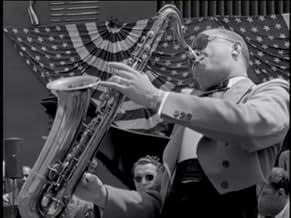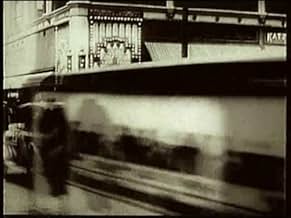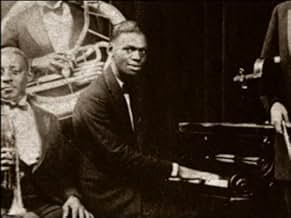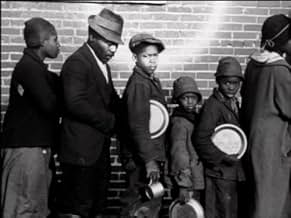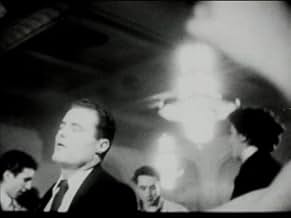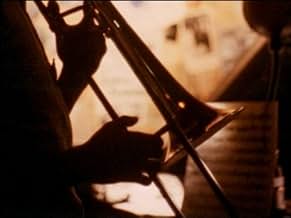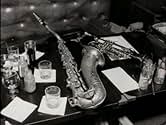Jazz: A Film by Ken Burns
- Mini serie TV
- 2001
- 1h 48min
VALUTAZIONE IMDb
8,6/10
2648
LA TUA VALUTAZIONE
Aggiungi una trama nella tua linguaA survey of the musical form's history and major talents.A survey of the musical form's history and major talents.A survey of the musical form's history and major talents.
- Candidato a 5 Primetime Emmy
- 2 vittorie e 7 candidature totali
Sfoglia gli episodi
Recensioni in evidenza
Ken Burns' Jazz documentary, which is a twenty-hour documentary (too long or not long enough would be the argument, I'd go with not long enough), details the history of Jazz from its origins in Ragtime, up until the 1960's. It is indeed insightful for those who do not know the histories of these people, pretty much all of them terrific or outstanding, and it does try to take you inside their world. As one who has only really gotten into Jazz within the past few years, as just a history lesson it keeps attention most of the way through.
The problems one can find in the documentary could be really squared down to two. The first is that Burns, while talented and obviously with a good research team and plethora of pictorial aids, forgets something about Jazz- it's supposed to be fun! There's something about the sense of humor and vitality of jazz that gets lost among the heavy-handed narrations, that make jazz out to be as mighty and colossal as the Greeks or the Romans. Jazz is important to the world of music, but much of what is spoken trumps most of the experiences in the stories (not that a few of them aren't entertaining- most of the stuff involving Armstrong, Bix, Blaisie, and Art Tatum keeps interest that way). The second problem, which is a given considering the length of the documentary, is that there isn't enough room for everyone, and after Miles and Coltrane, it just halts. It would be intriguing if Burns went back and did a 'special edition' treatment, and cover more ground on what he had, and expand into the great jazz that did come out since the 60's (and there has been a few, believe you/me).
If you're wanting to get into the atmosphere, the moods and histories (and of course the music, some of it rare here) on Jazz, basically this is the best place to start. But if you're already an aficionado, or if you don't have the utmost attention span to watch all of the footage, it may comes to let-down.
The problems one can find in the documentary could be really squared down to two. The first is that Burns, while talented and obviously with a good research team and plethora of pictorial aids, forgets something about Jazz- it's supposed to be fun! There's something about the sense of humor and vitality of jazz that gets lost among the heavy-handed narrations, that make jazz out to be as mighty and colossal as the Greeks or the Romans. Jazz is important to the world of music, but much of what is spoken trumps most of the experiences in the stories (not that a few of them aren't entertaining- most of the stuff involving Armstrong, Bix, Blaisie, and Art Tatum keeps interest that way). The second problem, which is a given considering the length of the documentary, is that there isn't enough room for everyone, and after Miles and Coltrane, it just halts. It would be intriguing if Burns went back and did a 'special edition' treatment, and cover more ground on what he had, and expand into the great jazz that did come out since the 60's (and there has been a few, believe you/me).
If you're wanting to get into the atmosphere, the moods and histories (and of course the music, some of it rare here) on Jazz, basically this is the best place to start. But if you're already an aficionado, or if you don't have the utmost attention span to watch all of the footage, it may comes to let-down.
The culture of the "People, all the People" has been Ken Burns' great theme. In the first two thirds of "Jazz" he eloquently presents these grand ideas. From Armstrong and Ellington to Billie Holiday and Benny Goodman we are swept along in a vibrant, multi-layered story of something special that would change the world.
But once the documentary reaches the 50's, the tale takes a radical turn. There is a lot of focus on drugs and broken lives. This may be important but these sad endings lead the film on a downward emotional spiral. (I understand why Spike Lee detests jazz musician's stories focusing on drugs.) But at least the music is good.
When the so called jazz music of the 60's and beyond is revealed, we see that the climax of this film is a betrayal of its beginning. The "People's music" has vanished. We see that "real" jazz is elitist and narrow and for the most part is a musical dead end.
We find that "real" jazz is played on acoustic instruments such as trumpets and saxophones. So, electric jazz guitarists are almost never mentioned as well as any electric keyboard players. And the only correct modern style comes straight from Be Bop. We hardly hear any Latin jazz or Fusion.
The great music promoter John Hammond once said that his most satisfying discovery was George Benson. Of course we never hear about Benson because he was popular and he plays electric guitar. No, instead the film's ending becomes an overblown promotion of Wynton Marsalis who since he acts as the film's "senior creative consultant" brings the great story down to an example of petty ego.
Overall "Jazz" has seven excellent episodes about a vital part of history and its effect on the world's music. Enjoy these and after that I would gently suggest to quit while you're ahead.
But once the documentary reaches the 50's, the tale takes a radical turn. There is a lot of focus on drugs and broken lives. This may be important but these sad endings lead the film on a downward emotional spiral. (I understand why Spike Lee detests jazz musician's stories focusing on drugs.) But at least the music is good.
When the so called jazz music of the 60's and beyond is revealed, we see that the climax of this film is a betrayal of its beginning. The "People's music" has vanished. We see that "real" jazz is elitist and narrow and for the most part is a musical dead end.
We find that "real" jazz is played on acoustic instruments such as trumpets and saxophones. So, electric jazz guitarists are almost never mentioned as well as any electric keyboard players. And the only correct modern style comes straight from Be Bop. We hardly hear any Latin jazz or Fusion.
The great music promoter John Hammond once said that his most satisfying discovery was George Benson. Of course we never hear about Benson because he was popular and he plays electric guitar. No, instead the film's ending becomes an overblown promotion of Wynton Marsalis who since he acts as the film's "senior creative consultant" brings the great story down to an example of petty ego.
Overall "Jazz" has seven excellent episodes about a vital part of history and its effect on the world's music. Enjoy these and after that I would gently suggest to quit while you're ahead.
I am neither a musician nor a serious scholar of jazz, just a fan,but even I could see the flaws in Ken Burns' sometimes fascinating, other times infuriating documentary on the history of "America's music".
Spanning the century, this nineteen hour documentary is most effective at the beginning, when Burns' gift for research is most apparent. You can see the pains he took searching documentation and rare photographs to paint a picture of the roots of the music. However, as the narrative moves on, his over-reliance for third and fourth hand accounts and his own ignorance of the genre becomes apparent.
I am not going to go into the laundry list of "should have" musicians (Lionel Hampton, Stan Getz, JJ Johnson, Charles Mingus gets only ten minutes!) and others that got short shrift or weren't even mentioned. I'd be here all day.
However, I will say that Burns obviously relied too much on critics and writers in putting together his material. Towards the end, especially when they begin to talk of the 50's and 60's, the whole program begins to have the taint of academia all over it.
For example, the 50s phenomenon of the wildly popular California-based "cool jazz" is dismissed by critic Nat Hentoff as "bland" and then never mentioned again.
I am sorry to disagree with the distinguished Mr. Hentoff, but as anyone who has heard the recordings of such greats as Gerry Mulligan and Chet Baker can atest, the music they were producing was just as creative and exciting as their East Coast, black contemporaries.
To people like Mr. Hentoff, the west coast musicians committed the ultimate sin of being white and somewhat popular. Much of the documentary continues along the same "us vs. them" vein.
It seems the people who assisted Mr. Burns took advantage of his ignorance and stamped their orthodox biases on what could have been a great work. Whole genres and types (fusion, Cubano, Brazillian) are either dismissed outright or ignored. It reinforces my view that critics are the most useless species on the face of the planet.
However, I do have to admit that many parts were fascinating. When Burns does interview eyewitnesses to certain events, it shows the flashes of "what might have been". I just wish that he wouldn't have blindly followed the opinions of the the critics and academics and let the audience discover for themselves what to think.
Spanning the century, this nineteen hour documentary is most effective at the beginning, when Burns' gift for research is most apparent. You can see the pains he took searching documentation and rare photographs to paint a picture of the roots of the music. However, as the narrative moves on, his over-reliance for third and fourth hand accounts and his own ignorance of the genre becomes apparent.
I am not going to go into the laundry list of "should have" musicians (Lionel Hampton, Stan Getz, JJ Johnson, Charles Mingus gets only ten minutes!) and others that got short shrift or weren't even mentioned. I'd be here all day.
However, I will say that Burns obviously relied too much on critics and writers in putting together his material. Towards the end, especially when they begin to talk of the 50's and 60's, the whole program begins to have the taint of academia all over it.
For example, the 50s phenomenon of the wildly popular California-based "cool jazz" is dismissed by critic Nat Hentoff as "bland" and then never mentioned again.
I am sorry to disagree with the distinguished Mr. Hentoff, but as anyone who has heard the recordings of such greats as Gerry Mulligan and Chet Baker can atest, the music they were producing was just as creative and exciting as their East Coast, black contemporaries.
To people like Mr. Hentoff, the west coast musicians committed the ultimate sin of being white and somewhat popular. Much of the documentary continues along the same "us vs. them" vein.
It seems the people who assisted Mr. Burns took advantage of his ignorance and stamped their orthodox biases on what could have been a great work. Whole genres and types (fusion, Cubano, Brazillian) are either dismissed outright or ignored. It reinforces my view that critics are the most useless species on the face of the planet.
However, I do have to admit that many parts were fascinating. When Burns does interview eyewitnesses to certain events, it shows the flashes of "what might have been". I just wish that he wouldn't have blindly followed the opinions of the the critics and academics and let the audience discover for themselves what to think.
10RobT-2
As a jazz fan for over 20 years now, ever since I first encountered the 6-LP "Smithsonian Collection of Classic Jazz" in the library of the college where my father taught, I could go on and on about all the stuff Ken Burns and company left out. However, part of me keeps imagining some kid latching onto this program the way I did with the Smithsonian LP's, then searching out jazz recordings, books on the subject, and recent copies of "Down Beat" magazine. Multiply this scenario by an unknown number (hundreds? thousands, perhaps?), not just with literal kids but all kinds of people open to discovery in the same way, and you get some idea of how I feel about the program.
Speaking again as a longtime jazz fan, even though I was a bit disappointed that more "modern" and avant-garde jazz wasn't included, the portions of "Jazz" covering swing were a revelation--I've never had such a direct visceral connection to that music before, though I've enjoyed it from time to time. This illustrates the major merit of "Jazz", the way it puts the viewer inside the world in which the music happened. One reason the swing segments are the best in that regard is that not only do we get to see what else was going on in the world at that time, we get to see the audience's interaction with the music--specifically, the dancing. This may be why "modern" jazz isn't emphasized as much; the audience's reaction couldn't be captured on camera in the same way.
The one theme I would have liked "Jazz" to cover in greater depth was its decline in popularity after swing had run its course and most young musicians were either getting into bebop or dixieland (the postwar revival of the latter being one of the program's more mysterious omissions). I think part of the problem lies in the definitional boundaries some of jazz's defenders have drawn around it. It seems to me that jazz was at its healthiest when its practitioners drew upon other musical traditions for ideas; this could mean classical music, showbiz pop, or most often other traditions of black music, notably the blues.
Once jazz had been firmly defined as an improvised music emphasizing certain kinds of instruments and instrumental combinations, there developed a tendency among jazz musicians to draw almost exclusively from earlier jazz styles, often the "purer" styles of recent vintage. After a certain point, any attempts at a new style were open to criticism over whether they were "really" jazz. (It's interesting, in this regard, that most of jazz's innovators have resisted purists' expectations of "jazz" musicians; just try to think of any musicians who added to the jazz vocabulary without doing something along the way that upset some group of purists or another.) Some new styles were accepted as the real stuff, others were not, which is a pity since some of them, especially rhythm & blues, might have lead to the reinvigoration of jazz as a popular art.
Louis Jordan is singled out in "Jazz" as someone who led black audiences awa y from jazz, yet his music developed directly from the swing music of the 30's and early 40's. How differently would jazz history be written if Jordan's kinds of innovations, which kept the music true to the experience of urban blacks without alienating potentially curious whites, were accepted as "real" jazz? After all, it's only a short step from Jordan to early rock &' roll.
It strikes me that, if jazz is really central to American music, an honest portrayal of jazz would include a full accounting of its influence on other American musical styles. Louis Jordan is one such example; the hard bop influence on the great 60's soul bands (notably Booker T. & the MG's, James Brown's bands, and the guys at Motown) is another; the use of jazz-schooled musicians by such disparate yet seminal bandleaders as Bob Wills and Spike Jones is yet another. Finally, jazz purism has robbed the music of some potentially valuable innovators, the best example being Jimi Hendrix, exactly the kind of instrumental prodigy who would have been a natural for jazz in an earlier time, but who went from r&b bands to rock & roll instead (contrast Ornette Coleman, who went from r&b bands to the jazz avant-garde).
And yet the faults of "Jazz" don't cancel out its many fine points, though they do throw them into sharper relief. I can't imagine any jazz fan failing to enjoy the music, and only a few who fail to learn something new about it. The fallout from "Jazz" as an event--the numerous arguments over the program's merits as history (many of these arguments concerning, at bottom, the definition of jazz) and the recent spur of jazz record (CD, tape, whatever) sales--is icing on the cake. On my own personal rating system, "Jazz" ranks just shy of an A+ (a "perfect" film) because I can imagine it being done better. Nevertheless, I'm giving it an IMDB rating of "10" for its entertainment value, its educational value, its status as a ublic event, and on general principles.
Speaking again as a longtime jazz fan, even though I was a bit disappointed that more "modern" and avant-garde jazz wasn't included, the portions of "Jazz" covering swing were a revelation--I've never had such a direct visceral connection to that music before, though I've enjoyed it from time to time. This illustrates the major merit of "Jazz", the way it puts the viewer inside the world in which the music happened. One reason the swing segments are the best in that regard is that not only do we get to see what else was going on in the world at that time, we get to see the audience's interaction with the music--specifically, the dancing. This may be why "modern" jazz isn't emphasized as much; the audience's reaction couldn't be captured on camera in the same way.
The one theme I would have liked "Jazz" to cover in greater depth was its decline in popularity after swing had run its course and most young musicians were either getting into bebop or dixieland (the postwar revival of the latter being one of the program's more mysterious omissions). I think part of the problem lies in the definitional boundaries some of jazz's defenders have drawn around it. It seems to me that jazz was at its healthiest when its practitioners drew upon other musical traditions for ideas; this could mean classical music, showbiz pop, or most often other traditions of black music, notably the blues.
Once jazz had been firmly defined as an improvised music emphasizing certain kinds of instruments and instrumental combinations, there developed a tendency among jazz musicians to draw almost exclusively from earlier jazz styles, often the "purer" styles of recent vintage. After a certain point, any attempts at a new style were open to criticism over whether they were "really" jazz. (It's interesting, in this regard, that most of jazz's innovators have resisted purists' expectations of "jazz" musicians; just try to think of any musicians who added to the jazz vocabulary without doing something along the way that upset some group of purists or another.) Some new styles were accepted as the real stuff, others were not, which is a pity since some of them, especially rhythm & blues, might have lead to the reinvigoration of jazz as a popular art.
Louis Jordan is singled out in "Jazz" as someone who led black audiences awa y from jazz, yet his music developed directly from the swing music of the 30's and early 40's. How differently would jazz history be written if Jordan's kinds of innovations, which kept the music true to the experience of urban blacks without alienating potentially curious whites, were accepted as "real" jazz? After all, it's only a short step from Jordan to early rock &' roll.
It strikes me that, if jazz is really central to American music, an honest portrayal of jazz would include a full accounting of its influence on other American musical styles. Louis Jordan is one such example; the hard bop influence on the great 60's soul bands (notably Booker T. & the MG's, James Brown's bands, and the guys at Motown) is another; the use of jazz-schooled musicians by such disparate yet seminal bandleaders as Bob Wills and Spike Jones is yet another. Finally, jazz purism has robbed the music of some potentially valuable innovators, the best example being Jimi Hendrix, exactly the kind of instrumental prodigy who would have been a natural for jazz in an earlier time, but who went from r&b bands to rock & roll instead (contrast Ornette Coleman, who went from r&b bands to the jazz avant-garde).
And yet the faults of "Jazz" don't cancel out its many fine points, though they do throw them into sharper relief. I can't imagine any jazz fan failing to enjoy the music, and only a few who fail to learn something new about it. The fallout from "Jazz" as an event--the numerous arguments over the program's merits as history (many of these arguments concerning, at bottom, the definition of jazz) and the recent spur of jazz record (CD, tape, whatever) sales--is icing on the cake. On my own personal rating system, "Jazz" ranks just shy of an A+ (a "perfect" film) because I can imagine it being done better. Nevertheless, I'm giving it an IMDB rating of "10" for its entertainment value, its educational value, its status as a ublic event, and on general principles.
Don't bother with the U.K. version (12 hours) buy the USA version (19.5 hours) it contains more and can usually be found at lower cost.
Covers the birth of jazz, swing era, move to bebop, free modal very well, but there is only scant coverage of more modern moves in the field of jazz.
Mr Burns has argued that he is more of an historian than a critic and as such he can only really deal with the phases of jazz that are from the past. This line of reasoning is, I think, not un-reasonable.
A nice touch on the DVDs is that when a piece of music is playing then pressing the "info" button on the DVD or its handset, brings up a screen about the music being played, e.g. title of music, who wrote it, who is playing, when was it recorded, etc.
Covers the birth of jazz, swing era, move to bebop, free modal very well, but there is only scant coverage of more modern moves in the field of jazz.
Mr Burns has argued that he is more of an historian than a critic and as such he can only really deal with the phases of jazz that are from the past. This line of reasoning is, I think, not un-reasonable.
A nice touch on the DVDs is that when a piece of music is playing then pressing the "info" button on the DVD or its handset, brings up a screen about the music being played, e.g. title of music, who wrote it, who is playing, when was it recorded, etc.
Lo sapevi?
- ConnessioniFeatured in WatchMojo: Top 10 Documentary Mini Series (2015)
I più visti
Accedi per valutare e creare un elenco di titoli salvati per ottenere consigli personalizzati
- How many seasons does Jazz have?Powered by Alexa
Dettagli
- Tempo di esecuzione
- 1h 48min(108 min)
- Colore
- Mix di suoni
- Proporzioni
- 1.33 : 1
Contribuisci a questa pagina
Suggerisci una modifica o aggiungi i contenuti mancanti


